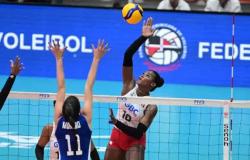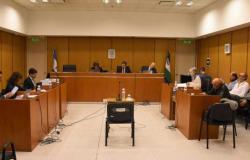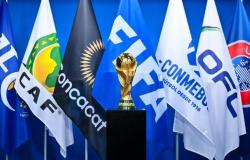Hear
The Federal Chamber of Criminal Cassation, with the votes of the judges Diego Barroetaveña, Carlos Mahiques and Daniel Petroneprevented the construction businessman Angelo CalcaterraCousin of Mauricio Macribe judged in the case of the bribe notebooksby maintaining that his case should be analyzed by the federal electoral justice system and not in an oral trial.
According to the chambermaids, Calcaterra’s payments must be interpreted not as bribes to maintain their works, but as contributions to the electoral campaign that were not declared. The measure extends to the other executive of the Iecsa company, Hector Javier Sánchez Caballerobut the criterion could also benefit defendants from other companies.
In fact, the same judges decided in another ruling to analyze whether it is appropriate to apply the same criteria to three other businessmen who admitted to having made money contributions to Kirchner officials. Are Armando Loson, Hugo Dragonetti and Jorge Balan. If these requests are successful, The trial for the bribery notebooks could be emptied of businessmen and only Cristina Kirchner and her former officials would be tried.
For two years there has been talk in political, business and judicial circles of finding a solution for businessmen that they admitted to the prosecutor Carlos Stornelli and the late judge Claudio Bonadio having made payments to Kirchnerism in the case of the notebooks, according to what was learned THE NATION. Was judicial operators of macrismowho pass the governments and continue weaving networks, who probed alternatives, without success, during the Cambiemos administration, and others who tried to reach the government of Javier Milei with this concern.
The idea of proposing to the oral court a “comprehensive repair” of the damage, so that making a financial contribution would extinguish the criminal action, but the idea did not prosper. It was a kind of probation. The current Minister of Justice, Mariano Cuneo Libaronawas then a lawyer for Hugo Eurnekiannephew of Eduardo Eurnekian, and explored the possibility of a similar solution, but it was not well received, said judicial officials familiar with that conversation. Finally, his defense strategy was successful, which was to affirm that the money was a campaign contribution and he managed to have his client’s case remain in the court of the federal judge with electoral jurisdiction. Maria Servini.
The general argument that revolved around the conversations of the time was that the cause of the notebooks trapped the main businessmen, owners of the fortunes of Argentina and public works, and that this was a “luxury” that could not be afforded. country at that time.
In this Wednesday’s ruling, judges Barroetaveña, Mahiques and Petrone decided: “To allow the appeal brought by the private defense of Ángel Jorge Antonio Calcaterra and Héctor Javier Sánchez Caballero, to annul the appealed decision, to declare the jurisdiction of the Court “National Criminal and Federal Correctional Institution No. 1 with electoral jurisdiction to intervene in the facts that are attributed in this case to those named.” They thus referred the case to the Servini court.
The case of the bribery notebooks began with a newspaper investigation THE NATION which revealed the notes of Oscar Centeno, former driver of the Ministry of Federal Planning, about his time at official offices and companies to take and bring bribes. In some cases, Their trips ended in Cristina Kirchner’s apartment, in Recoleta.where according to the testimonies, the bags were received by his secretary, the deceased Daniel Muñoz. At the time, Justice detected the former secretary of the Kirchners more than 110 properties in Argentina and about US$70 million in real estate in the United States. If the money came from those bags, it was not allocated to any campaign.
Cristina Kirchner is accused of 27 acts of bribery and as the head of an illicit association. Along with her, the main defendants are the former officials From Vido, Baratta, José López and the driver Centeno, the financier Ernesto Clarens and businessmen Calcaterra, Carlos Wagner (former head of the Argentine Chamber of Construction) and Nestor Otero (the concessionaire of the Retiro bus station), among others.
Some of the businessmen declared that they were sorry in the case of the notebooks and admitted having made payments to Kirchner officials. Calcaterra testified on August 6, 2018 and admitted payments, but said that Roberto Baratta demanded money from him for the Kirchnerism campaigns of 2013 and 2015, when the Iecsa company was going through difficult times due to its economic situation. He admitted that The payments were as stated in the notebooks.although for smaller amounts than those that appear in the notes of former driver Oscar Centeno.
Iecsa was acquired in 2017 by Marcelo Mindlin, along with his brother Damián and trusted executives Gustavo Mariani and Ricardo Torres. Once the purchase was formalized, Sánchez Caballero was replaced as CEO of the company due to the investigations against him. The firm is investigated in court in another file, the cause of Odebrechtfor the payment of bribes for the Burial of the Sarmiento Railway.
In the case of the notebooks, Calcaterra said that the payments were made in the garage of the Hilton Hotel, located at Macacha Güemes 307, in Puerto Madero, on October 1, 2013, June 30, 2015, July 13, 2015 and August 4, 2015; and in Manuela Sáenz 323, on September 11, 17, 18 and 25, 2013, July 16, 2013, August 1, 2013, October 22, 2013, May 28, 2015, August 18, 2015 , September 14, 2015 and October 21, 201”. These money deliveries “were a contribution to the electoral campaigns,” she stated.
He explained that the sums of money delivered in 2013 were linked to the electoral process carried out that year, with the Primary, Open, Simultaneous and Mandatory Elections (PASO) taking place on August 1, 2013 and the elections of legislators. on October 27 of the same year” and that the money deliveries in 2015 “had to do with the Primary Elections of August 9 and the Presidential Elections of October 25 of the same year.”
In the case it was proven that a part of that money collected by Baratta and Lazarte was allocated to the political line managed by Juan Manuel Abal Medinathen Cristina Kirchner’s Chief of Staff, and her secretary Martin Larraburuwho collected money for electoral campaigns.
The defense recalled that there have already been three cases of other businessmen who in 2022 were benefited by Judge Julián Ercolini with a similar ruling. Manuel Santos Uribelarreasaid Hugo Eurnekian and Alejandro Ivanissevich They declared that they made donations for the elections that were not registered and their cases went to the electoral justice system, where they were not sanctioned.
In this case, Judge Servini asked the judges of the Federal Oral Court No. 7 to recuse themselves from holding the trial and send her the section that involves Calcaterra. But the judges rejected it, with the same criteria that the prosecutor maintained. Fabiana Leon. Against this ruling, the businessman’s defense went to the Court of Cassation, which in December of last year decided to open the complaint and process it.
There were hearings where the accused argued and the prosecutor Raúl Pleé opposed sending the case to the electoral justice system, knowing that it was a path to impunity. Calcaterra reached the trial stage being prosecuted for active bribery, that is, the payment of bribes, repeated 16 times.
Judges Mahiques, Barroetaveña and Petrone said that Calcaterra’s statements about what Baratta was asking him for money for the campaign were never investigated, and that it must be appreciated that these statements were spontaneous. They mentioned that the payment dates coincide with the electoral campaigns and that the statements Abal Medina and Larraburu coincide with those of Calcaterra.
The judges, thus, decided to send the matter to the electoral justice system “in order to achieve a faster and better administration of justice that, in turn, is compatible with principles of constitutional and conventional order.” Diego Barroetaveña was the author of the vote that summarizes the arguments, his colleagues Mahiques and Petrone adhered. Barroetaveña signed the ruling and left for the United States.





